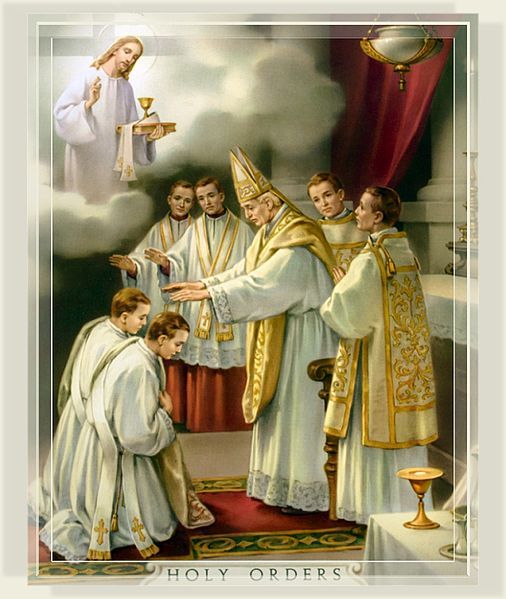Holy Orders

1536 Holy Orders is the sacrament through which the mission entrusted by Christ to his apostles continues to be exercised in the Church until the end of time: thus it is the sacrament of apostolic ministry. It includes three degrees: episcopate, presbyterate, and diaconate.
The one priesthood of Christ
1544 Everything that the priesthood of the Old Covenant prefigured finds its fulfillment in Christ Jesus, the "one mediator between God and men."15 The Christian tradition considers Melchizedek, "priest of God Most High," as a prefiguration of the priesthood of Christ, the unique "high priest after the order of Melchizedek";16 "holy, blameless, unstained,"17 "by a single offering he has perfected for all time those who are sanctified,"18 that is, by the unique sacrifice of the cross.
1545 The redemptive sacrifice of Christ is unique, accomplished once for all; yet it is made present in the Eucharistic sacrifice of the Church. The same is true of the one priesthood of Christ; it is made present through the ministerial priesthood without diminishing the uniqueness of Christ's priesthood: "Only Christ is the true priest, the others being only his ministers."19
WHO CAN RECEIVE THIS SACRAMENT?
1577 "Only a baptized man (vir) validly receives sacred ordination."66 The Lord Jesus chose men (viri) to form the college of the twelve apostles, and the apostles did the same when they chose collaborators to succeed them in their ministry.67 The college of bishops, with whom the priests are united in the priesthood, makes the college of the twelve an ever-present and ever-active reality until Christ's return. The Church recognizes herself to be bound by this choice made by the Lord himself. For this reason the ordination of women is not possible.68
1578 No one has a right to receive the sacrament of Holy Orders. Indeed no one claims this office for himself; he is called to it by God.69 Anyone who thinks he recognizes the signs of God's call to the ordained ministry must humbly submit his desire to the authority of the Church, who has the responsibility and right to call someone to receive orders. Like every grace this sacrament can be received only as an unmerited gift.
1579 All the ordained ministers of the Latin Church, with the exception of permanent deacons, are normally chosen from among men of faith who live a celibate life and who intend to remain celibate "for the sake of the kingdom of heaven."70 Called to consecrate themselves with undivided heart to the Lord and to "the affairs of the Lord,"71 they give themselves entirely to God and to men. Celibacy is a sign of this new life to the service of which the Church's minister is consecrated; accepted with a joyous heart celibacy radiantly proclaims the Reign of God.72
1580 In the Eastern Churches a different discipline has been in force for many centuries: while bishops are chosen solely from among celibates, married men can be ordained as deacons and priests. This practice has long been considered legitimate; these priests exercise a fruitful ministry within their communities.73 Moreover, priestly celibacy is held in great honor in the Eastern Churches and many priests have freely chosen it for the sake of the Kingdom of God. In the East as in the West a man who has already received the sacrament of Holy Orders can no longer marry.
